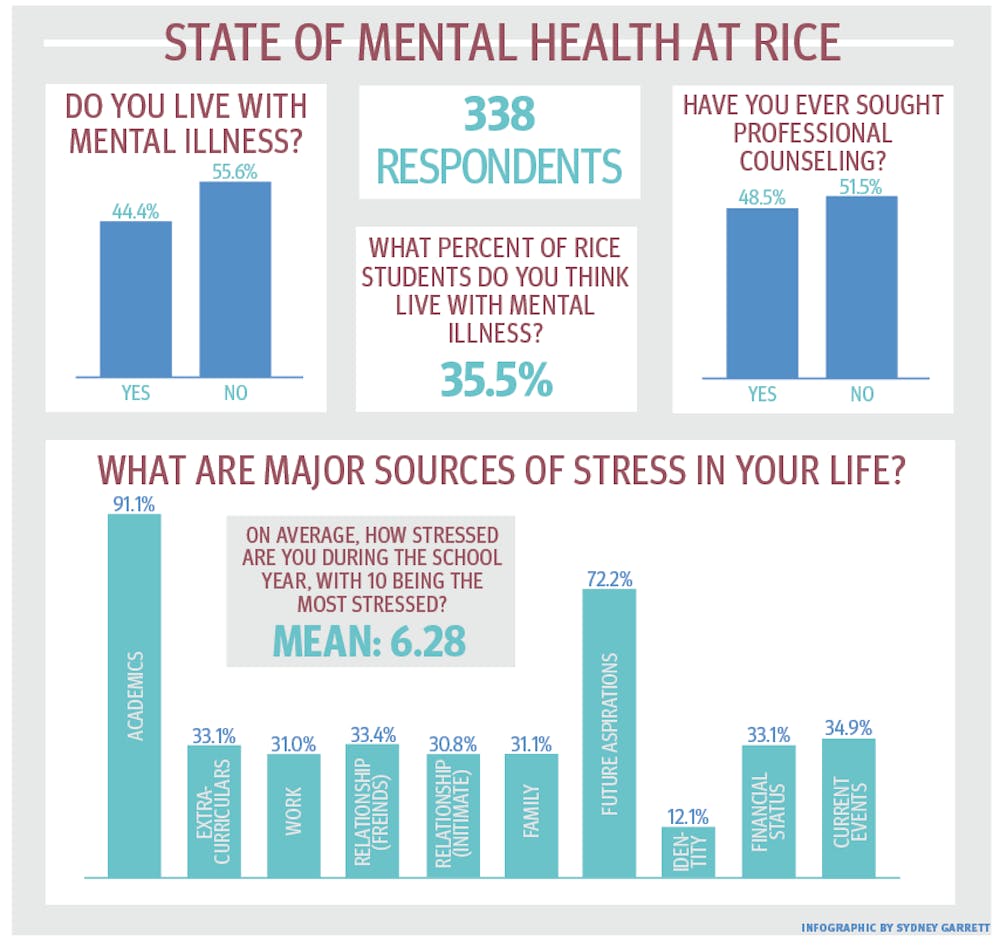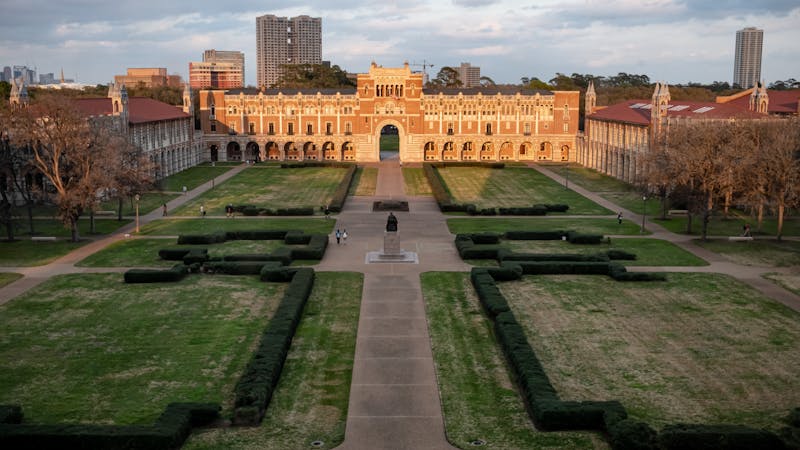Mental health forum addresses survey results

A Rice Alliance for Mental Health Awareness survey distributed to Rice undergraduates and graduates showed 44.4 percent of respondents said they have lived or currently live with a mental illness and 57 percent of respondents agreed or strongly agreed that they felt comfortable talking about mental health on campus. Following the release of these results, RAMHA organized Rice’s first ever Mental Health Forum to raise awareness about mental health resources on campus and destigmatize discussion regarding mental illnesses.
A total of 338 students responded to the anonymous survey, including a disproportionate percentage of women, freshmen and graduate students. Co-President Cindy Hwang, a Sid Richardson College senior, said while the data is by no means representative of the student body, she was satisfied with the response rate, especially because mental health is such a difficult topic.
RAMHA organized the survey and forum in conjunction with the SA Wellbeing Committee, Rice’s Women’s Resource Center and the Rice Health Advisors.
“It was interesting to see this raw data from Rice because I don’t think it’s really been collected before,” Hwang said.
While most participants agreed with the statement “I feel mentally healthy,” 68 percent also felt at some point mental health had interfered with their daily life at Rice.
At the forum, which had about 100 attendees, students heard professors and staff from the Wellbeing Center speak on various topics regarding mental health from their respective fields, from sociology to psychiatry, and had the opportunity to initiate discussions on mental health with other students and the panelists themselves.
“This event allowed students to broaden their knowledge on mental health and encouraged students to talk themselves,” Hwang said.
Hwang said many student’s immediate response to mental health issues is to not do anything about it because these issues are so stigmatized, or because they feel they don’t need outside help and can manage it themselves.
Each panelist shared their own stories and perspectives on mental health and said it was important to become better mental health activists, especially in a stress-prone university environment.
Survey respondents’ average level of stress on a scale from 1 to 10 was 6.28. Students almost universally cited academics as a top source of stress, with other major sources including future aspirations and extracurriculars.
RAMHA Co-President Helen Wei, a Will Rice College junior, said although a certain amount of academic stress at an upper level institution is inevitable, there is a surprisingly large amount of students who cited stress as having impacted their daily life.
“One of the major differences we wanted to have people cognizant about is what is a healthy level of stress, and when does it get to be so much that you should seek help,” Wei said.
Approximately 81 percent of students who were found to have lived with or still live with a mental illness sought professional counseling. Depression and anxiety disorders were overwhelmingly perceived as the most common mental illnesses that students deal with at Rice.
According to Tony Brown, a sociology professor, community-based psychiatric epidemiologic studies suggest about half of people experience a clinical disorder at some point in their lifetime.
“Yet, only half of persons with diagnosable disorders will ever get professional treatment,” Brown said. “I hope that, one day, taking care of one’s psychological well being becomes as routine as brushing one’s teeth.”
Laura Vargas, a Sid Richardson College freshman, said the open discussion at the forum may help students feel more comfortable talking about issues regarding mental health in the future.
“Hearing the personal experiences of the professors and the personal times when they’ve been down and reached out to someone else made me realize that even these successful adults have dealt with mental health issues,” Vargas said.
The survey found perceptions of campus atmosphere surrounding mental health and on campus resource accessibility varied depending on the respondent’s own mental health. 48.7 percent of people living with mental illness were comfortable discussing mental health, compared to the 64.4 percent of people without.
With regards to campus resources, 35.3 percent of people living with mental illness thought that mental health resources on campus suited their needs, compared to the 48.9 percent of people without.
Agnes Ho, Director of the Rice Student Wellbeing Office, said she hoped conversations from the forum continue in the future.
“Participating in the forum was an opportunity to hear directly from students and work together to address their needs,” Ho said. “We hope that the forum can become an ongoing dialogue on campus and we support students and student organizations that continue this effort to build positive connections in our community.”
Hwang said the data was decent for an informal student-organized survey, but implementing an official survey required for all Rice students would provide much more accurate and representative data of the numbers of students living with mental illnesses.
“It’s important to have those numbers because they can help the campus and administrators decide what resources are actually needed and what people are looking for, and be able to cater towards that more specifically,” Hwang said.
For more information about the services provided by the Wellbeing and Counseling Center, please visit the Gibbs Wellness Center, or their website, wellbeingandcounseling.rice.edu, or call 713-348-3311.
This article was edited to add graduate students to the first sentence.
More from The Rice Thresher

Rice accepts 13% of record-setting ED applications
Rice accepted 13.2% of Early Decision applicants in its first round of admissions for the class of 2029, said Yvonne Romero da Silva, vice president for enrollment. With 2,970 total applicants, this year saw yet another record-high; a 3% increase from last year’s previous high of 2,886. An additional 100 students gained admission through the Questbridge National College Match program, an uptick from last year’s 77.

Students reject divestment proposals
The student body voted to pass S.REF 01, which asks the Rice Management Company to disclose all of its holdings investments, but rejected the remaining divestment proposals. While every ballot measure gained a majority of votes in favor, the remaining three did not achieve the two-thirds majority required to pass.

Student organizations form coalition to support SA referenda
Four Student Association referenda open for the general student body vote today at noon. The referenda call for disclosure of Rice Management Company holdings and divestment from entities that profit off the Israel-Hamas war. The referenda also ask that Rice release a statement condemning genocide and materially support anti-colonial scholarship. Voting will close Dec. 11 at noon and the results will be published the next day. For the referenda to pass, a two-thirds majority with a 20% student body turnout is needed.

Please note All comments are eligible for publication by The Rice Thresher.